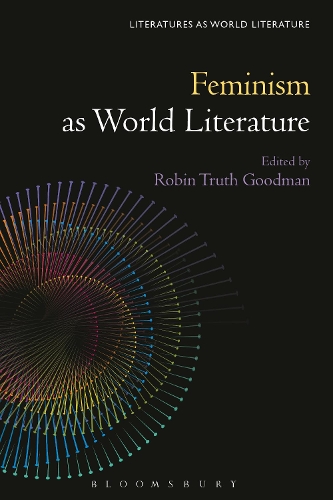
Feminism as World Literature
(Hardback)
Available Formats
Publishing Details
Feminism as World Literature
By (Author) Professor Robin Truth Goodman
Bloomsbury Publishing PLC
Bloomsbury Academic USA
1st December 2022
United States
Classifications
Professional and Scholarly
Non Fiction
Literary theory
Feminism and feminist theory
809.89287
Physical Properties
Hardback
320
Width 152mm, Height 229mm
Description
The conventional lineage of World Literature starts with Goethe and moves through Marx, Said, Moretti, and Damrosch, among others. What if there is another way to trace the lineage, starting with Simone de Beauvoir and moving through Hannah Arendt, Assia Djebar, Octavia Butler, Donna Haraway, Karen Barad, and Gayatri Spivak What ideas and issues get left out of the current foundations that have institutionalized World Literature, and what can be added, challenged, or changed with this tweaking of the referential terminology Feminism as World Literature redefines the thematic and theoretical contents of World Literature in feminist terms as well as rethinking feminist terms, analyses, frameworks, and concepts in a World Literature context. Other ideas built into World Literature and its criticism are viewed here by feminist framings, including the environment, technology, immigration, translation, work, race, governance, image, sound, religion, affect, violence, media, future, and history. The authors recognize genres, strategies, and themes of World Literature that demonstrate feminism as integral to the world-making gestures of literary form and production. In other words, this volume looks to readings and modes of reading that expose how the historical worldliness of texts allows for feminist interventions that might not sit clearly or comfortably on the surfaces.
Reviews
Feminism is at once a paradigm and project of globality but, as Robin Truth Goodman points out in her introduction to this trenchant collection, the world-making of feminism has not always been acknowledged as a pivotal condition of world literature as such. Divided into sections examining genres, strategies, and themes, the book assembles leading critics in the field to reconstellate the parameters of world literature as a feminist imperative. Whether reading the political imaginary of Mahasweta Devi or confronting the question of the 'human' in the work of Maryse Cond, the contributors offer vibrant ways to understand the complex cultural genealogies of feminism in a global frame. A timely intervention. * Peter Hitchcock, Professor of English, Baruch College and the Graduate Center, CUNY, USA *
Feminism as World Literature is a major critical intervention, which offers a much-needed renegotiation of world literature through the framework of feminism. The volumes compelling introduction and seventeen chapters authoritatively establish feminism as an integral part of world literature, while also offering a nuanced account of how a world-literature perspective recasts feminist terms and assumptions. This discipline-defining book will be required reading for scholars and students of world literature as well as of feminism and its legacies. * Anna Watz, Associate Professor of English, Linkping University, Sweden *
A much-needed contribution to the 'as World Literature' series, Feminism as World Literature critically reads feminism through the prism of world literature and vice versa. Presenting a wide geographical, historical and thematic range, its engagement with feminist planetary world-making and environmental, gender, and racial justice, as well as with different genres (e.g., hip hop, science fiction) and strategies make it an important contribution to both feminist scholarship and to the study of World and Comparative Literature. * Liedeke Plate, Professor of Culture and Inclusivity, Radboud University, Netherlands *
Author Bio
Robin Truth Goodman is Professor of English at Florida State University, USA. Her published works include Gender Commodity: Marketing Feminist Identities and the Promise of Security (Bloomsbury, 2022), Understanding Adorno, Understanding Modernism (Bloomsbury, 2020), The Bloomsbury Handbook of 21st Century Feminist Theory (2019), Promissory Notes: On the Literary Conditions of Debt (2018), Gender for the Warfare State: Literature of Women in Combat (2016), and Literature and the Development of Feminist Theory (2015).
